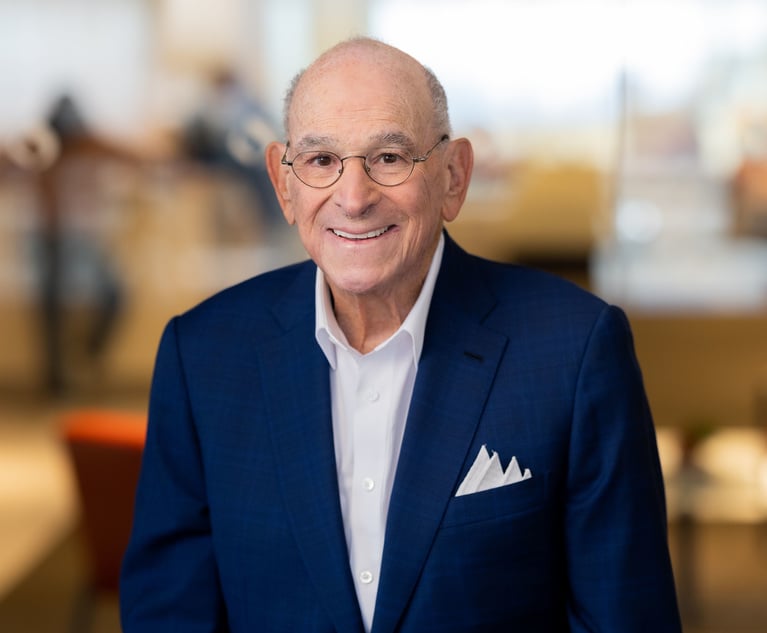 (Photo: zimmytws/Shutterstock.com)
(Photo: zimmytws/Shutterstock.com)Third Bar Association Beats Back Constitutional Challenges, but Appeals Loom
Judge Joe Heaton of the U.S. District Court for the Western District of Oklahoma dismissed two claims by Oklahoma lawyer Mark Schell but allowed one to proceed.
September 18, 2019 at 06:12 PM
3 minute read
The original version of this story was published on Texas Lawyer
A federal judge in Oklahoma Wednesday partially dismissed an attorney's constitutional challenge to that state's bar association—a lawsuit that is strikingly similar to one pending against the State Bar of Texas.
The ruling dismissed two of three claims by Oklahoma attorney Mark Schell, marking the third time a state bar association has beat back similar allegations.
The attorneys bringing similar suits argue that using the bars' mandatory membership and dues to fund alleged ideological and political purposes—like advocating for gay rights—violates the Constitution's protections for free speech and freedom of association. They've initially failed with such arguments in three states, as bar associations in Oregon and North Dakota have notched rulings similar to the one in Oklahoma.
Judge Joe Heaton of the U.S. District Court for the Western District of Oklahoma dismissed two claims by plaintiff Schell but allowed one to proceed: Schell's challenge about whether the Oklahoma bar had the right procedures in place to protect lawyers who don't want to subsidize certain bar activities.
Jacob Huebert, senior attorney at the Goldwater Institute in Phoenix, who represents the Oklahoma plaintiffs, said they will appeal the dismissed claims. Goldwater Institute also represents attorneys who are appealing losses of similar claims against bar associations in Oregon and North Dakota.
"We're hopeful the Supreme Court will take one of these cases and end mandatory bar membership and fees across the country," Huebert said.
Carol Manning, director of communications for the Oklahoma bar, didn't respond to a request for comment before deadline.
Among other things, the Oklahoma defendants asserted Schell failed to state a claim because the bar's operations were constitutional under two U.S. Supreme Court cases—Lathrop v. Donohue, which found that compulsory bar membership and dues were constitutional, and Keller v. State Bar of California, which found that the bar can spend funds constitutionally on activities that regulate the legal profession and improve the quality of legal services.
The court agreed that two of Schell's claims failed, and noted it wasn't persuaded by his contention that the U.S. Supreme Court's 2018 ruling in Janus v. AFSCME required a different result. Janus involved payment of agency fees by nonmembers of a public employee union, but this case has differences, the court determined.
"There is also no suggestion in Janus that either Lathrop or Keller were overruled or otherwise called into question," the order said. "In such circumstances, the court is obliged to follow the cases which most directly control, and therefore declines to speculate as to whether the Supreme Court might reach some different result if it were to revisit either Lathrop or Keller."
In Texas, three attorneys and the Texas bar have raised similar arguments, and are awaiting a federal judge to rule on cross-motions for summary judgment.
Vinson & Elkins partner Tom Leatherbury, who represents the Texas bar, declined to comment.
Consovoy Park McCarthy partner Jeffrey Harris of Arlington, Virginia, who represents the Texas plaintiffs, didn't return an email seeking comment.
|Read the order in Schell's case:
This content has been archived. It is available through our partners, LexisNexis® and Bloomberg Law.
To view this content, please continue to their sites.
Not a Lexis Subscriber?
Subscribe Now
Not a Bloomberg Law Subscriber?
Subscribe Now
NOT FOR REPRINT
© 2024 ALM Global, LLC, All Rights Reserved. Request academic re-use from www.copyright.com. All other uses, submit a request to [email protected]. For more information visit Asset & Logo Licensing.
You Might Like
View All
These Law Firm Leaders Are Optimistic About 2025, Citing Deal Pipeline, International Business
6 minute read
‘A Force of Nature’: Littler Mendelson Shareholder Michael Lotito Dies At 76
3 minute read
Remembering Am Law 100 Firm Founder and 'Force of Nature' Stephen Cozen
5 minute read
Legal Departments Gripe About Outside Counsel but Rarely Talk to Them
4 minute readTrending Stories
- 1Call for Nominations: Elite Trial Lawyers 2025
- 2Senate Judiciary Dems Release Report on Supreme Court Ethics
- 3Senate Confirms Last 2 of Biden's California Judicial Nominees
- 4Morrison & Foerster Doles Out Year-End and Special Bonuses, Raises Base Compensation for Associates
- 5Tom Girardi to Surrender to Federal Authorities on Jan. 7
Who Got The Work
Michael G. Bongiorno, Andrew Scott Dulberg and Elizabeth E. Driscoll from Wilmer Cutler Pickering Hale and Dorr have stepped in to represent Symbotic Inc., an A.I.-enabled technology platform that focuses on increasing supply chain efficiency, and other defendants in a pending shareholder derivative lawsuit. The case, filed Oct. 2 in Massachusetts District Court by the Brown Law Firm on behalf of Stephen Austen, accuses certain officers and directors of misleading investors in regard to Symbotic's potential for margin growth by failing to disclose that the company was not equipped to timely deploy its systems or manage expenses through project delays. The case, assigned to U.S. District Judge Nathaniel M. Gorton, is 1:24-cv-12522, Austen v. Cohen et al.
Who Got The Work
Edmund Polubinski and Marie Killmond of Davis Polk & Wardwell have entered appearances for data platform software development company MongoDB and other defendants in a pending shareholder derivative lawsuit. The action, filed Oct. 7 in New York Southern District Court by the Brown Law Firm, accuses the company's directors and/or officers of falsely expressing confidence in the company’s restructuring of its sales incentive plan and downplaying the severity of decreases in its upfront commitments. The case is 1:24-cv-07594, Roy v. Ittycheria et al.
Who Got The Work
Amy O. Bruchs and Kurt F. Ellison of Michael Best & Friedrich have entered appearances for Epic Systems Corp. in a pending employment discrimination lawsuit. The suit was filed Sept. 7 in Wisconsin Western District Court by Levine Eisberner LLC and Siri & Glimstad on behalf of a project manager who claims that he was wrongfully terminated after applying for a religious exemption to the defendant's COVID-19 vaccine mandate. The case, assigned to U.S. Magistrate Judge Anita Marie Boor, is 3:24-cv-00630, Secker, Nathan v. Epic Systems Corporation.
Who Got The Work
David X. Sullivan, Thomas J. Finn and Gregory A. Hall from McCarter & English have entered appearances for Sunrun Installation Services in a pending civil rights lawsuit. The complaint was filed Sept. 4 in Connecticut District Court by attorney Robert M. Berke on behalf of former employee George Edward Steins, who was arrested and charged with employing an unregistered home improvement salesperson. The complaint alleges that had Sunrun informed the Connecticut Department of Consumer Protection that the plaintiff's employment had ended in 2017 and that he no longer held Sunrun's home improvement contractor license, he would not have been hit with charges, which were dismissed in May 2024. The case, assigned to U.S. District Judge Jeffrey A. Meyer, is 3:24-cv-01423, Steins v. Sunrun, Inc. et al.
Who Got The Work
Greenberg Traurig shareholder Joshua L. Raskin has entered an appearance for boohoo.com UK Ltd. in a pending patent infringement lawsuit. The suit, filed Sept. 3 in Texas Eastern District Court by Rozier Hardt McDonough on behalf of Alto Dynamics, asserts five patents related to an online shopping platform. The case, assigned to U.S. District Judge Rodney Gilstrap, is 2:24-cv-00719, Alto Dynamics, LLC v. boohoo.com UK Limited.
Featured Firms
Law Offices of Gary Martin Hays & Associates, P.C.
(470) 294-1674
Law Offices of Mark E. Salomone
(857) 444-6468
Smith & Hassler
(713) 739-1250








